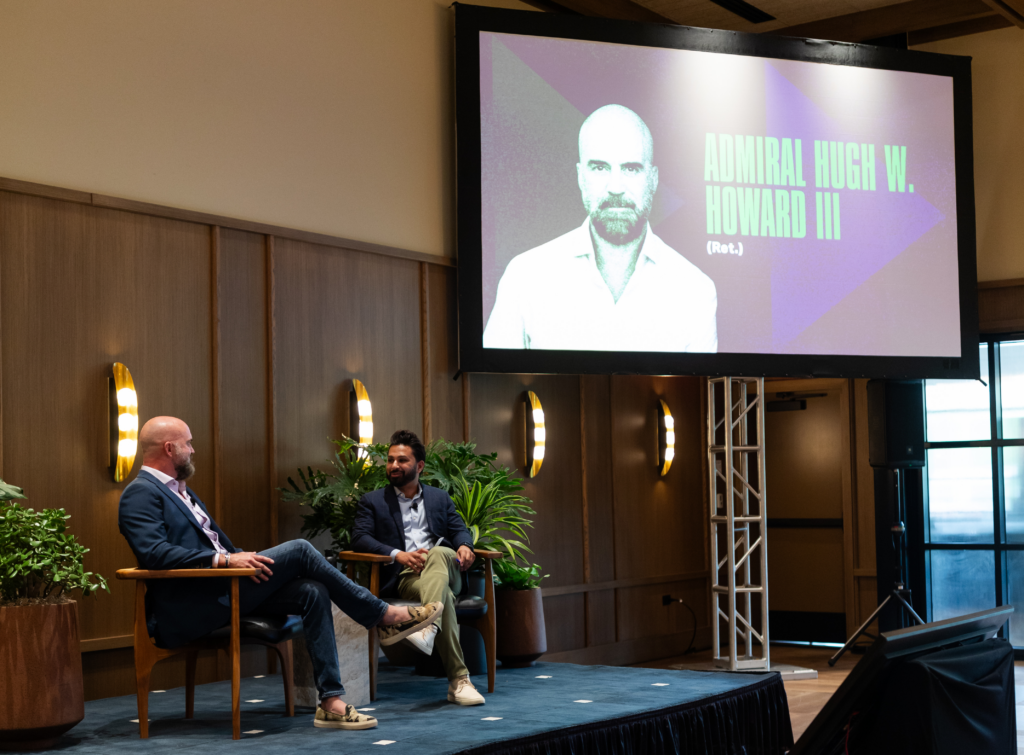
A focus on mental health makes the strongest teams even stronger
By Rebecca Heslep, InnoSource director of human resources
A few of us at InnoSource recently had the opportunity to listen to an inspiring leader.
Rear Admiral Hugh Howard, who retired last year as top commander for the U.S. Navy SEALS, was one of the keynote speakers at the annual RTRX event during Pelotonia Ride Weekend in Columbus. Rear Adm. Howard spent 32 years in the military, with a majority of that time dedicated to fighting wars in Iraq and Afghanistan.
Our team left with deep respect and admiration for Rear Adm. Howard’s military accomplishments, of course. But we have been thinking more about a different battle he waged, against the stigma that surrounds mental health and the challenges in addressing mental illness.
Rear Adm. Howard told us all that mental illness is no stranger to the military community, and talked about the U.S. Navy’s efforts to help members of the military access treatment. It’s hard for me to even imagine how servicepeople cope with what they see at war — and unfortunately, too many never do, as the admiral described.
In recent years Rear Adm. Howard and other leaders observed the toll mental illness was having on the SEALS, so they decided to overhaul the Navy’s mental health programs. Rear Adm. Howard described it as “turning the system upside down” to protect the lives of those who serve. They recognized the stigma that surrounded mental health and treatment for mental illness, and wanted to elevate mental wellness in a system that had, seemingly, not prioritized it in the past.
Leaving the event, I thought about the mental health challenges that pervade our communities. We know that mental illnesses are still stigmatized, and we know that people often do not understand how to seek treatment or get assistance when dealing with mental challenges. I kept thinking: If the Navy SEALs are making mental health such a priority for their people, certainly the business world can do the same. Of course, a business career here in the U.S. is vastly different than a life of military service. But the fact is mental health is health, and for any organization to succeed, no matter what industry, it must have a team that is healthy and well.
According to a survey conducted by the American Psychological Association, 57% of American workers reported that they experienced negative impacts of work-related stress in the last month. Those surveyed said effects of stress included feelings of burnout, emotional exhaustion, lower desire to be productive — even consideration of quitting.
Clearly the impact of mental health is all around us no matter where we work. And without the wellness of employees, either physically or mentally, how can a company possibly succeed?
Studies show the importance of mental health support in the workplace is one of the top priorities for the younger generations that are now entering the workforce. It’s an aspect of work that is here to stay. And one could certainly argue mental wellness in the workplace should have been a bigger priority much sooner than it ever was.
At InnoSource, the mental health of our employees has always been important, however, that importance became especially clear in 2020, when we all were forced to work in a remote environment and could not build or maintain our community in the same way we had in the past. Since then, we’ve doubled down on our efforts to support our team members.
Our regular efforts include providing employees with weekly one-on-one meetings with their supervisors. As someone who has several direct reports, I use these meetings to go beyond the common daily chatter and have truly uninterrupted time together. Oftentimes, we talk more about what’s going on in our lives than just the daily tasks of our work. I believe strongly that creating time to have that human-to-human connection really helps our employees to feel supported at a personal level.
We’ve also created more communal workspaces at our corporate offices to encourage collaboration and connection. We also use these spaces to hold pop-up lunches on Fridays, which has built upon the camaraderie and bond between our team members.
Many of us were brought up to identify the business case of everything we do, and the data shows us that there is a strong business case for supporting associates’ mental health — beyond it just being the right thing to do. When employees aren’t well, the service to our customers suffers. If they don’t feel they have the support they need, they might quit. In the world of recruiting, we know how detrimental that can be to a company.
While many companies are doing great things to help support their employees, there is always more work to be done to destigmatize how our society feels about mental health and ensure all team members are set up to be successful. And as Rear Adm. Howard showed us, looking after the mental well-being of people isn’t a weakness — it’s a focus that has made one of the strongest units of people in the world even stronger.

